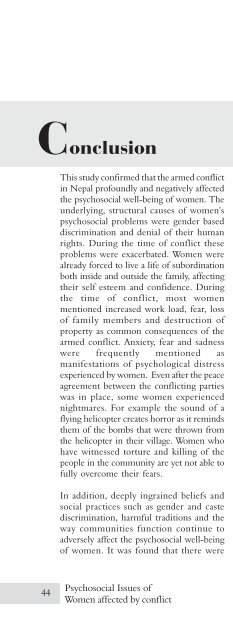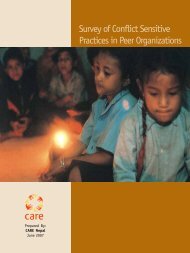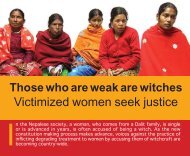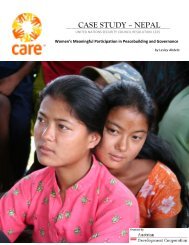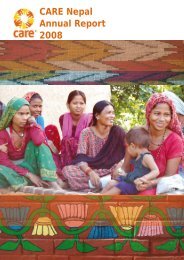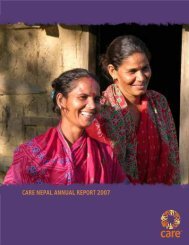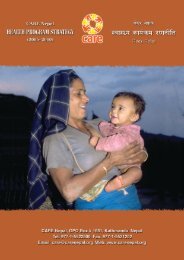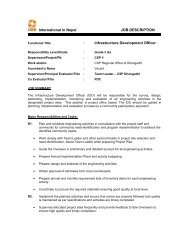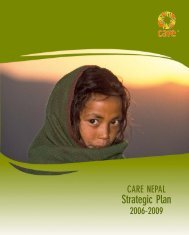Untitled - Care Nepal
Untitled - Care Nepal
Untitled - Care Nepal
Create successful ePaper yourself
Turn your PDF publications into a flip-book with our unique Google optimized e-Paper software.
Conclusion<br />
This study confirmed that the armed conflict<br />
in <strong>Nepal</strong> profoundly and negatively affected<br />
the psychosocial well-being of women. The<br />
underlying, structural causes of women's<br />
psychosocial problems were gender based<br />
discrimination and denial of their human<br />
rights. During the time of conflict these<br />
problems were exacerbated. Women were<br />
already forced to live a life of subordination<br />
both inside and outside the family, affecting<br />
their self esteem and confidence. During<br />
the time of conflict, most women<br />
mentioned increased work load, fear, loss<br />
of family members and destruction of<br />
property as common consequences of the<br />
armed conflict. Anxiety, fear and sadness<br />
were frequently mentioned as<br />
manifestations of psychological distress<br />
experienced by women. Even after the peace<br />
agreement between the conflicting parties<br />
was in place, some women experienced<br />
nightmares. For example the sound of a<br />
flying helicopter creates horror as it reminds<br />
them of the bombs that were thrown from<br />
the helicopter in their village. Women who<br />
have witnessed torture and killing of the<br />
people in the community are yet not able to<br />
fully overcome their fears.<br />
In addition, deeply ingrained beliefs and<br />
social practices such as gender and caste<br />
discrimination, harmful traditions and the<br />
way communities function continue to<br />
adversely affect the psychosocial well-being<br />
of women. It was found that there were<br />
insufficient supportive systems in the<br />
community for women. To fulfill the unmet<br />
needs of women, various suggestions came<br />
out from the research participants including<br />
awareness raising programs on women's<br />
rights- not only for women but also for men<br />
and other concerned people in the<br />
community; improvements at the policy<br />
level; and educational and training support<br />
for women to develop themselves both<br />
socially and economically.<br />
The social and cultural context in which<br />
women live is largely responsible for their<br />
psychosocial distress. Women are told not<br />
to travel at night; if they do they are scolded.<br />
There is a strong community feeling that<br />
daughters should stay at home ("chori<br />
manche gharmaii basnu parcha.") This<br />
concept flourished during the conflict and<br />
further disempowered women. It was found<br />
that women and the community felt<br />
insecurity from both conflicting parties.<br />
Communities particularly from bahun and<br />
chetri communities expect the newly wed<br />
girl to respect her husband, fulfilling the<br />
role of a subordinate. This respect is taken<br />
as a sign of family honour. Therefore women<br />
are highly dependent on their husbands in<br />
every aspect of their life. Some women have<br />
received support from their husbands in the<br />
time of joy and sorrow ("sukha and dukha")<br />
so they consider their husbands as God.<br />
While many have received troubles most of<br />
44<br />
Psychosocial Issues of<br />
Women affected by conflict


